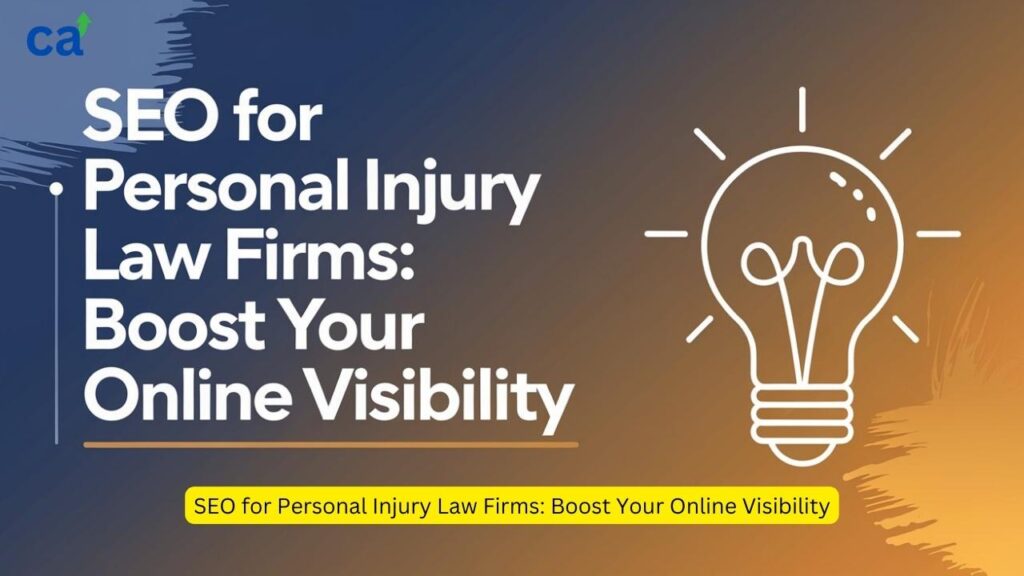
Introduction
In today’s digital world, establishing a strong online presence is essential for personal injury law firms. With clients increasingly turning to the internet to search for legal services, optimizing your website for search engines is no longer optional—it’s a necessity. Search Engine Optimization (SEO) can significantly impact the visibility of your firm, helping you attract more clients and stay ahead of your competitors. This guide will walk you through key SEO strategies specifically tailored for personal injury law firms, providing actionable tips to help you boost your online visibility and grow your client base.
The Importance of SEO for Personal Injury Law Firms
SEO allows potential clients to discover your law firm through organic searches. In the highly competitive legal industry, particularly in personal injury law, appearing at the top of Google’s search results can give you an advantage over competitors. Here’s why SEO is critical:
- Increased Visibility: Ranking high on search engines ensures that your firm is visible to potential clients when they search for personal injury lawyers in their area.
- Targeted Traffic: SEO brings in qualified leads by matching your services with the specific search queries of users who need your expertise.
- Credibility and Trust: A strong online presence through SEO not only increases your visibility but also establishes your firm as a trustworthy and credible authority in personal injury law.
- Cost-Effective Marketing: Compared to traditional advertising, SEO delivers long-term results with a better ROI (Return on Investment).
Keyword Research: The Foundation of SEO
Keyword research is the first step in any effective SEO strategy. By identifying the keywords and phrases that potential clients use when searching for personal injury legal services, you can tailor your content to meet their needs.
Steps for Conducting Keyword Research:
- Use SEO Tools: Tools like Google Keyword Planner, Ahrefs, and SEMrush allow you to find relevant keywords with high search volumes and low competition.
- Concentrate on Long-Tail Keywords: These keywords are more precise and typically face less competition. Examples include phrases like “personal injury lawyer in [city]” or “car accident attorney near me.” These keywords target users who are closer to making a hiring decision.
- Examine Competitors: Evaluate the keywords that your competitors are currently ranking for. This can give you insight into what potential clients are searching for and help you identify gaps in your content.
On-Page SEO Optimization for Personal Injury Law Firms
Once you’ve identified your target keywords, it’s time to implement them through on-page SEO. On-page SEO refers to optimizing the individual pages of your website to rank higher in search engines. Here are some essential on-page optimization techniques:
1. Title Tags and Meta Descriptions
Your title tag and meta description are the first things users see on search engine result pages (SERPs). Make sure they include your primary keywords and are crafted to entice clicks. For example:
- Title: “Experienced Personal Injury Lawyer in [City] | Free Consultation”
- Meta Description: “Get the compensation you deserve. Contact our top-rated personal injury lawyers in [City] for a free consultation. No fees unless we win.”
2. High-Quality Content
Content is the backbone of SEO. Regularly publish informative and relevant blog posts, practice area pages, and case studies that incorporate your target keywords naturally. Consider covering topics like:
- What to Do After a Car Accident
- How to File a Personal Injury Claim
- Common Mistakes to Avoid in Personal Injury Cases
Make sure your content provides value, answers common questions, and is tailored to the needs of your audience.
3. Internal Linking
Internal links guide users through your website and help search engines understand the structure of your site. Link related content to each other, such as blog posts about car accidents linking to your car accident attorney service page. This can help boost the ranking of other pages on your site.
4. Mobile Optimization
A significant percentage of searches for personal injury law firms are conducted on mobile devices. Ensure your website is mobile-friendly, fast-loading, and easy to navigate. Google prioritizes mobile-optimized sites in its rankings, so this step is critical.
5. URL Structure
Keep your URLs clean and simple. Include relevant keywords in your URLs to help search engines and users understand the page’s content. For example:
www.yourlawfirm.com/personal-injury-lawyer-city
Local SEO: Targeting Clients in Your Area
For personal injury law firms, local SEO is crucial because most of your clients will be searching for attorneys in their geographic area. Here are some key local SEO strategies:
1. Google Business Profile Optimization
Take control and maximize your Google Business Profile (formerly known as Google My Business). This ensures your firm shows up in local search results, particularly in the Google Local Pack, which displays the top local businesses relevant to a user’s query. To optimize your profile:
- Fill out all business information: Include your firm’s name, address, phone number, hours of operation, and services.
- Add high-quality images: Upload professional photos of your office, team, and events to build credibility.
- Encourage client reviews: Positive reviews on Google can boost your ranking and help potential clients trust your services.
2. Local Keywords
Incorporate location-specific keywords into your website content, such as “personal injury lawyer in [city]” or “best accident attorney in [region].” These keywords help you rank higher for users searching for services in a particular area.
3. Local Citations
Ensure your firm is listed consistently across online directories such as Yelp, Avvo, and Lawyers.com. These citations should have consistent information about your firm’s name, address, and phone number (NAP), which helps with local SEO rankings.
Link Building: Earning Backlinks for Authority
Backlinks from credible websites indicate to search engines that your website is reliable and authoritative. This is particularly important for personal injury law firms, as authority can significantly impact rankings. Here are some strategies to build high-quality backlinks:
1. Legal Directories
Submit your firm to credible legal directories such as Justia, FindLaw, and Avvo. These sites not only provide backlinks but also drive potential clients to your website.
2. Guest Blogging
Reach out to legal blogs or industry-related websites to write guest posts. You can include a link back to your website in exchange. This can drive traffic and improve your site’s domain authority.
3. Partnerships and Sponsorships
Form partnerships with local businesses or sponsor community events. When these organizations mention your firm on their websites, it often includes a backlink, which benefits your SEO.
4. Press Releases
If your firm is involved in any community projects, case wins, or significant developments, publish a press release. Many news outlets and blogs may pick up the story, providing valuable backlinks.
Monitoring and Evaluating SEO Results
SEO is an ongoing process that requires monitoring and adjustments. Use tools like Google Analytics, Google Search Console, and SEMrush to track your progress. Key metrics to monitor include:
- Organic traffic: The number of visitors coming to your site through search engines.
- Keyword rankings: How well your target keywords are ranking over time.
- Conversion rates: The percentage of visitors who take action, such as filling out a consultation form or calling your office.
- Bounce rate: The percentage of visitors who leave your site without engaging with it. A high bounce rate could indicate that your site needs improvements in usability or content relevance.
Conclusion
Implementing a robust SEO strategy is critical for personal injury law firms looking to increase their online visibility and attract more clients. By focusing on keyword research, on-page optimization, local SEO, and link building, your firm can rank higher on search engines, drive more targeted traffic, and grow its client base.




